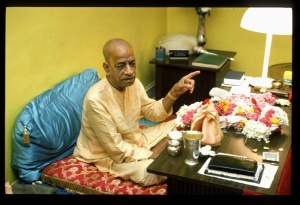CC Madhya 25.93: Difference between revisions
No edit summary |
(Vanibot #0054 edit - transform synonyms into clickable links, which search similar occurrences) |
||
| Line 17: | Line 17: | ||
<div class="synonyms"> | <div class="synonyms"> | ||
'' yei sūtra-kartā'' | '' [//vanipedia.org/wiki/Special:VaniSearch?s=yei&tab=syno_o&ds=1 yei] [//vanipedia.org/wiki/Special:VaniSearch?s=sūtra&tab=syno_o&ds=1 sūtra]-[//vanipedia.org/wiki/Special:VaniSearch?s=kartā&tab=syno_o&ds=1 kartā]'' — the person who has made the ''Vedānta-sūtra''; ''[//vanipedia.org/wiki/Special:VaniSearch?s=se&tab=syno_o&ds=1 se]'' — that person; ''[//vanipedia.org/wiki/Special:VaniSearch?s=yadi&tab=syno_o&ds=1 yadi]'' — if; ''[//vanipedia.org/wiki/Special:VaniSearch?s=karaye&tab=syno_o&ds=1 karaye] [//vanipedia.org/wiki/Special:VaniSearch?s=vyākhyāna&tab=syno_o&ds=1 vyākhyāna]'' — explains the meaning; ''[//vanipedia.org/wiki/Special:VaniSearch?s=tabe&tab=syno_o&ds=1 tabe]'' — then; ''[//vanipedia.org/wiki/Special:VaniSearch?s=sūtrera&tab=syno_o&ds=1 sūtrera]'' — of the aphorisms of the ''Vedānta-sūtra''; ''[//vanipedia.org/wiki/Special:VaniSearch?s=mūla&tab=syno_o&ds=1 mūla]'' — the original; ''[//vanipedia.org/wiki/Special:VaniSearch?s=artha&tab=syno_o&ds=1 artha]'' — meaning; ''[//vanipedia.org/wiki/Special:VaniSearch?s=lokera&tab=syno_o&ds=1 lokera]'' — of the people in general; ''[//vanipedia.org/wiki/Special:VaniSearch?s=haya&tab=syno_o&ds=1 haya] [//vanipedia.org/wiki/Special:VaniSearch?s=jñāna&tab=syno_o&ds=1 jñāna]'' — comes within knowledge. | ||
</div> | </div> | ||
Latest revision as of 23:19, 19 February 2024
Śrī Caitanya-caritāmṛta - Madhya-līlā - Chapter 25: How All the Residents of Vārāṇasī Became Vaiṣṇavas

His Divine Grace
A.C. Bhaktivedanta Swami Prabhupada
A.C. Bhaktivedanta Swami Prabhupada
TEXT 93
- yei sūtra-kartā, se yadi karaye vyākhyāna
- tabe sūtrera mūla artha lokera haya jñāna
SYNONYMS
yei sūtra-kartā — the person who has made the Vedānta-sūtra; se — that person; yadi — if; karaye vyākhyāna — explains the meaning; tabe — then; sūtrera — of the aphorisms of the Vedānta-sūtra; mūla — the original; artha — meaning; lokera — of the people in general; haya jñāna — comes within knowledge.
TRANSLATION
"If the Vedānta-sūtra is explained by Vyāsadeva himself, who has written it, its original meaning can be understood by the people in general.